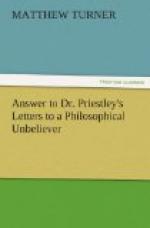But it will be said, those who commit crimes are atheists at the time at least they do so. But an atheist cannot be superstitious, and criminals are often so at the very moment of their crimes. Religious persuasion men are not doubted to have when they vent their rage upon others of a different way of thinking, when they express a dread of danger or a zeal for ceremonies. These at least are not virtues; and few indeed must be those, who at any time are really Theists, if their faith is lost or forgotten every time they have a mind to indulge a vitious passion. To support still the efficacy of religion in making men virtuous is to oppose metaphysical reasoning to the truth of fact; it is like the philosopher denying motion, and being refuted by one of his scholars walking across the room. If then it is true, as history and the whole course of human life shew it is, that men can still plunge themselves into all sorts of crimes, though they are persuaded of the truth of religion, which is made to inform them that God punishes sin and rewards good actions, it cannot but be suspected that religion even encourages crimes, by the hopes it gives of pardon through the efficacy of prayer; at all events it must be granted, that those who hold up a belief in God as a sufficient proof and character of a good life are most egregiously mistaken.
Some Theists may have lighter sense of personal dignity than some atheists. If the Theist thinks himself allied to and connected with the Deity he may plume himself upon his station; but how apt are those worshipers of a God, instead of having a high sense of personal dignity, to debase themselves into the most abject beings, dreading even the shadow of their own phantom. An atheist feeling himself to be a link in the grand chain of Nature, feels his relative importance and dreads no imaginary Being. An atheist, who is so from inattention and without intelligence, may indeed feel himself as much debased as the meanest and most humble Theist.
Another argument against atheists is, that where men are atheists it is generally found that their usual turn of thinking and habits of life have inclined to make them so. Is not this to be turned upon Theists? But granting that the idea of a supreme author is more pleasing, and that the argument with respect to the existence or non-existence of a God was in equilibrio, it is not therefore right to conclude that the mind ought to be determined by this or any other bias. Nor is it quite clear if there is no God (by which term let it again be noticed, is meant a Being of supreme intelligence, the contriver of the material universe and yet no part of the material system) that the world in which man inhabits is either fatherless or deserted. The wisdom of nature supplies in reality what is only hoped for from the protection of the Deity. If the world has so good a mother, a father may well be spared especially such a haughty jealous, and vindictive one as God is




